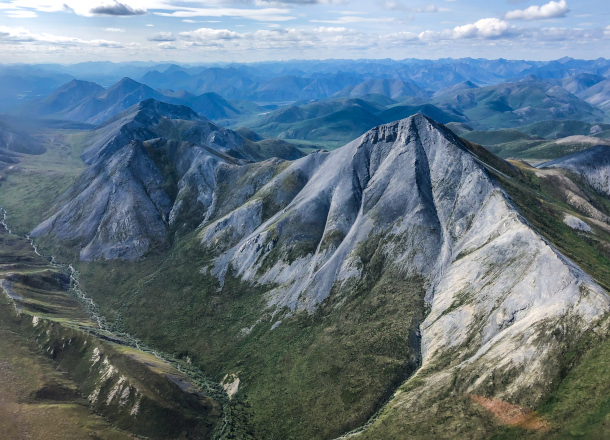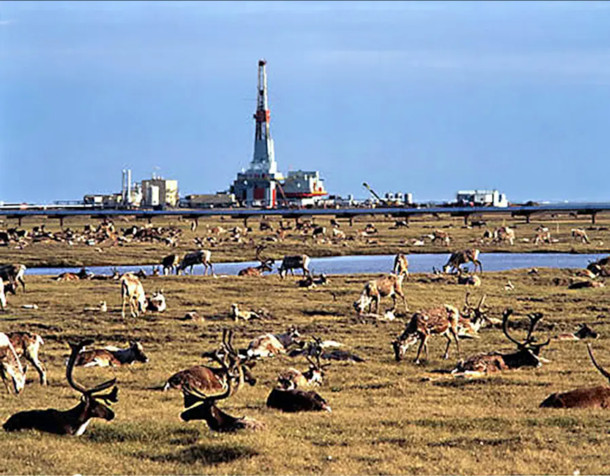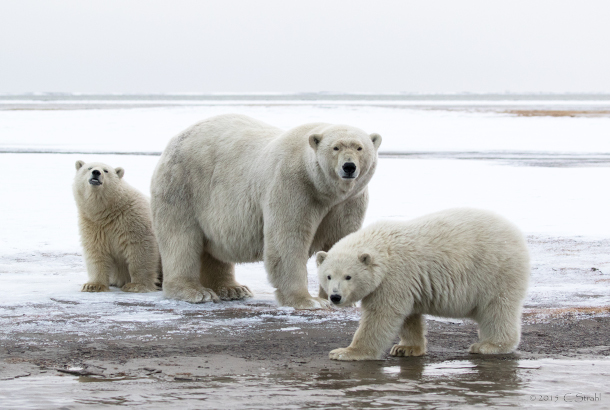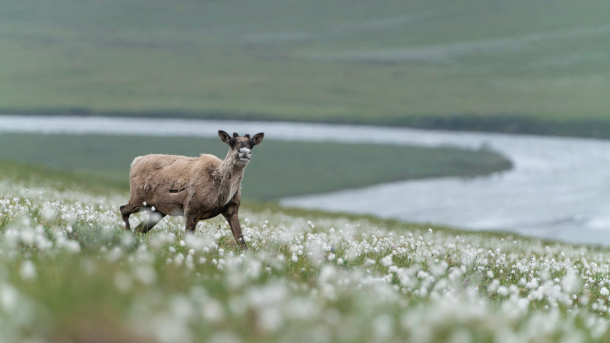Oil Leasing Court Fights
Air Date: Week of June 25, 2021

An aerial view of the expansive mountainous landscape in the Arctic National Wildlife Refuge. (Photo: Danielle Brigida, Flickr, Public Domain)
One of President Biden’s key campaign promises was to wean the country off of fossil fuels and move towards sustainable energy sources. He’s attempting to achieve this in part by halting the sale of new oil and gas leases on public lands, including at the Arctic National Wildlife Refuge, but these efforts have been challenged in the courts. Vermont Law School Professor Pat Parenteau joins host Jenni Doering to discuss the legal issues of pausing oil and gas development.
Transcript
BASCOMB: It’s Living on Earth, I’m Bobby Bascomb.
DOERING: And I’m Jenni Doering.
The Arctic National Wildlife Refuge in Alaska has been the focus of one of the biggest battles over fossil fuel development in the US. It's especially controversial because the coastal plain where drilling would occur is home to the calving grounds for the Porcupine caribou. And it’s consecrated land for the indigenous Gwich'in people who know it as "the sacred place where life begins". The Republican-led Congress passed legislation in 2017 that authorized development of ANWR for oil and gas, as part of the Tax Cuts and Jobs Act. The Trump administration held lease sales there just before leaving office, but the Biden administration paused all new oil and gas leasing just days after taking office and has also suspended the ANWR leases. Now, a federal judge in Louisiana has paused the pause, saying the President had no such authority. Here to discuss is Vermont Law School Professor Pat Parenteau. Pat, welcome back to Living on Earth!
PARENTEAU: Nice to be with you, Jenni.
DOERING: So please first get us up to speed on what the Biden administration is trying to do to halt new leases for drilling on federal lands, including in the Arctic National Wildlife Refuge. How exactly was the administration proposing to pause those leases?

Caribou graze on the grass under the backdrop of an oil rig in Prudhoe Bay, Alaska. (Photo: Erika Hall, Flickr, CC BY-SA 2.0)
PARENTEAU: Yeah, the Biden administration through the new Interior Secretary Haaland, issued what's called a suspension order. The leases were granted in the Trump administration, they were sold for, I think something around $58 million. One of the interesting things about that lease sale was that none of the oil companies bid on the leases. And none of the American banks agreed to finance any development and ANWR. So it was the state of Alaska through a coalition that actually bought the leases. So they were sold. And the next step would be permits for exploration, which would have a big impact on this very sensitive tundra, coastal plain of ANWR. And before any of those drilling or exploration permits, I should say, were to be processed, Secretary Haaland put a stay, a suspension on the leases. That's been challenged, of course, by the state of Alaska and some other groups in American Petroleum Institute. So that case is pending. And what the Biden administration is saying is that there were irregularities in the way the leases were offered by the Trump administration, not the least of which was a faulty environmental impact statement under the National Environmental Policy Act. For example, the leasing process did not consider the climate change impacts of leasing the coastal plain. And so the suspension was designed to give Interior time to review these issues and come up with a determination as to how they would proceed, including potentially canceling the leases.
DOERING: Now, I understand that just recently, a federal judge in Louisiana actually put a pause on the Biden administration's pause. He delivered this preliminary injunction on the administration's decision to pause leasing. So what's going on there, Pat?

The Arctic National Wildlife Refuge has become a nursery ground for polar bears. The expansion of oil leasing in ANWR puts the endangered species at particular risk. (Photo: Cheryl Strahl, Flickr, CC BY-NC 2,0)
PARENTEAU: The judge you're talking about is a Trump appointee to the federal district court in Louisiana, of course, Louisiana, heavily dependent on Gulf Coast oil development. So not a big surprise to some of us that you might find a Trump appointee, siding with industry. It was a preliminary decision. The Biden administration is reviewing its options. One option would be to go to the Fifth Circuit Court of Appeals and request a stay of the district court's order. Another option, which Secretary Haaland hinted at in some testimony she recently gave in the Congress in the United States Senate, is that they might accelerate this ongoing review. I mentioned the review of the ANWR leases, but there's a much broader review of the entire federal oil and gas leasing program both offshore like the Gulf and onshore all the public lands in the western United States which supplies something on the order of a quarter or a third of the oil and gas that the nation either consumes or exports. The judge in Louisiana said that Interior has no authority to pause leases and let alone cancel them or deny them. And that's an issue, I should say, that hasn't been resolved in the federal courts. We don't have a definitive ruling, certainly not from the Supreme Court., on how much discretion will the Biden administration have going forward in both holding lease sales, and awarding leases. So will Interior hold off appealing this lower court decision in order to build a better record for why it acted to suspend those leases in the Gulf as well as leases elsewhere? And I'm thinking that's probably what the administration will do. They'll be on stronger legal ground, I think, if they bolster the record. Again, you have the same kinds of problems with the Gulf Coast leasing, as you had in Alaska, and that is a failure to deal with the climate effects of all of this ongoing leasing. The other interesting point is that there's already more oil and gas under lease in the United States, both offshore and onshore and even in the state of Alaska, than the oil companies can possibly develop over the next 10 years. That's how much leasing took place, not only under the Trump administration, by the way, this goes all the way back to the Obama administration, Obama leased more federal land for oil and gas than any other president. This isn't strictly a partisan issue. This is a bigger geopolitical issue about energy policy. So this issue of what's the future of oil and gas leasing under these federal programs, wide open and much to be determined going forward.
DOERING: Right, I mean, what's really at stake here? You know, it sounds like the supply is not an issue for these oil companies. There's plenty of leases out there already that are under contract. So why are they putting up such a big fight in places like the Arctic National Wildlife Refuge, and across the board?

The Arctic National Wildlife Refuge is home to a vast array of wildlife, including caribou. (Photo: Danielle Brigida, Flickr, CC BY 2.0)
PARENTEAU: It's interesting that the oil companies themselves are experiencing, you know, a change, shall we say. And, you know, companies like Shell, which of course has just recently been issued a judgment in the Netherlands, from a Dutch court ordering Shell to reduce its emissions by 45% by 2030. Shell had already announced it was going to be net carbon zero by 2050. And Shell's response to this Dutch court decision is that is simply going to accelerate our timeframe. You can go down the list BP, British Petroleum, responsible for Deepwater Horizon blowout, of course, has made lots of noise, about diversifying its energy portfolio, investing in renewables and so forth. So the demand side of this equation is shifting. We're also seeing a big shift in the financial markets. We saw what BlackRock with $7 trillion in assets said no more leasing, we're not going to include in our portfolio anymore new leasing. That's not to say they're going to eliminate ongoing leasing activity, but no more new leasing. No more coal, said BlackRock, a lot of these battles that we're seeing are kind of the death throes of the industry. We saw that with the coal companies going bankrupt back in the Obama, two terms of the Obama administration, the coal industry is not coming back in the United States. And I think the oil and gas industry is poised to experience the same kind of maybe not as abrupt change, because we do need liquid fuels. I mean, we're not ready to shift completely to electricity in this country, either for heating or for transportation. So we're going to need oil and gas. The question is, how fast can we bring renewables on and electric vehicles on to completely eliminate the demand for oil and gas? That's the issue today.
DOERING: So President Biden hasn't been completely consistent in his administration's fossil fuel development policies. You know, in part, he's responding to this call for moving away from fossil fuels. He revoked the permit for the Keystone XL pipeline, but he is still allowing the Dakota Access pipeline to continue operating for now. He said no to drilling in the Arctic National Wildlife Refuge. But he had to say yes to an oil drilling project in the nearby National Petroleum Reserve also in Alaska. So he's seems to be balancing the continuation of fossil fuel development for now with move away from it as well. How do you see this trend fitting in with Biden's longer term goals of getting the country off of fossil fuels someday entirely?

Former EPA Regional Counsel Pat Parenteau teaches environmental law at Vermont Law School. (Photo: Courtesy of Vermont Law School)
PARENTEAU: Yeah, he's really trying to balance on a knife point, isn't he? It's all about the politics of these various issues. For example, the National Petroleum Reserve is an interesting comparison to ANWR. I mean, the National Petroleum Reserve was set up to develop oil and gas and commitments were made by Congress to the state of Alaska. And a lot of investment has gone in to the National Petroleum Reserves. So you know, it's clear, he's drawing a line between New leasing and ANWR, and ongoing leasing in NPR, the National Petroleum Reserve. And the same thing with Keystone and Dakota Access. In Keystone's case, he was saying I'm revoking the permit to bring the tar sands into the United States for this proposed new pipeline. I mean, there are parts of this pipeline already exists, but the key question was, was he going to allow a major expansion of imported tar sands from Alberta? So there again, you see, that's a preemptive strike. That's Biden saying, no, we're not going to, you know, expand the existing pipeline to bring in even more tar sands from Canada with regard to Dakota Access, on the other hand, that pipelines obviously finished. It's pumping all kinds of, you know, millions of gallons of oil every day. Lots of jobs depend on that. And that's a concern for Biden, you know, he's got to keep faith with the unions. They helped elect him, he took a hit by rejecting Keystone from the union. So that's exactly where Biden is going to be for the next three and a half years in his first term. He wants to accelerate the transition away from fossil. It's clear in his infrastructure bill, it's clear in his policies, but he's got to maintain enough political support to get things done in Congress. And you know, we know how narrow those margins are in both the Senate and the House, in the same thing with policies and rules. He's got to take account of the fact we now have the most conservative Supreme Court we've seen in a generation or more. And he can't simply assert all the authority he might want. He's going to have to temper what he can do with what the courts are going to allow him to do under existing law. So that's the reality for Joe Biden. He's working his way through a minefield, political, legal and other.
DOERING: Pat Parenteau is a professor of environmental law at Vermont Law School. Pat, thanks so much for taking this time with us today.
PARENTEAU: Oh, good to be with you, Jenni. Thank you.
Links
New York Times | “Biden Sets in Motion Plan to Ban New Oil and Gas Leases on Federal Land”
New York Times | “Federal Judge Says Biden Cannot Pause New Leases For Drilling on Public Lands”
Living on Earth wants to hear from you!
Living on Earth
62 Calef Highway, Suite 212
Lee, NH 03861
Telephone: 617-287-4121
E-mail: comments@loe.org
Newsletter [Click here]
Donate to Living on Earth!
Living on Earth is an independent media program and relies entirely on contributions from listeners and institutions supporting public service. Please donate now to preserve an independent environmental voice.
NewsletterLiving on Earth offers a weekly delivery of the show's rundown to your mailbox. Sign up for our newsletter today!
 Sailors For The Sea: Be the change you want to sea.
Sailors For The Sea: Be the change you want to sea.
 The Grantham Foundation for the Protection of the Environment: Committed to protecting and improving the health of the global environment.
The Grantham Foundation for the Protection of the Environment: Committed to protecting and improving the health of the global environment.
 Contribute to Living on Earth and receive, as our gift to you, an archival print of one of Mark Seth Lender's extraordinary wildlife photographs. Follow the link to see Mark's current collection of photographs.
Contribute to Living on Earth and receive, as our gift to you, an archival print of one of Mark Seth Lender's extraordinary wildlife photographs. Follow the link to see Mark's current collection of photographs.
 Buy a signed copy of Mark Seth Lender's book Smeagull the Seagull & support Living on Earth
Buy a signed copy of Mark Seth Lender's book Smeagull the Seagull & support Living on Earth

